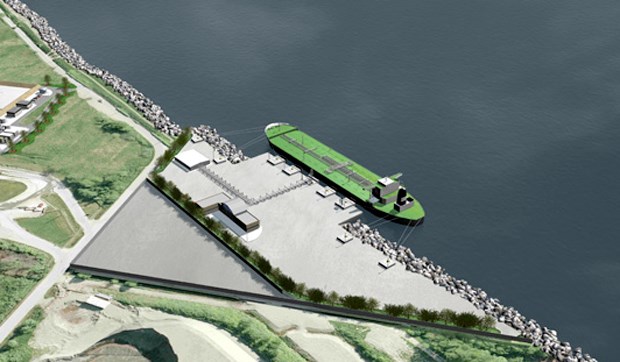Steveston-Richmond East MP Joe Peschisolido said the Canadian government was “completely caught off guard” by Port Metro Vancouver’s issuance of a building permit late last month for a jet fuel terminal on the south arm of the Fraser River, near Riverport.
“The Minister (of Transport Marc Garneau) was shocked at the timing. He was caught unaware and was extremely disappointed in the timing of the permit and was taken aback. I’ll be less than diplomatic and say I was shocked by it,” said Peschisolido.
In February, the port gave the green light to construct a jet fuel delivery terminal and six storage tanks, as well as parts of a pipeline to Vancouver International Airport
Peschisolido questioned what the rush was, considering the government has instituted new interim requirements for pipeline projects before a more extensive review of the Canadian Environmental Assessment Act.
One of those interim measures, however, is that “no project proponent will be asked to return to the starting line - project reviews will continue within the current legislative framework.”
Yet Peschisolido indicated that the jet fuel project is “not a done deal.”
He called the port an arms length entity that is nevertheless accountable to the Ministry of Transport.
Another interim measure is to assess direct and indirect greenhouse gas emissions linked to projects. This did not happen with the jet fuel project, nor was the Department of Fisheries and Oceans or Environment Canada a "responsible authority" in the project's environmental assessment (which was conducted by the B.C. Environmental Assessment Agency).
“The unfortunate thing is the changes that the Conservatives made (to the act in 2012) were horrific; they gutted the whole system. What would have happened under the old act is there would have been a full assessment with the Ministry of Environment, and the Department of Fisheries and Oceans, but that was curtailed,” said Peschisolido.
Retired fisheries biologist Otto Langer and president of VAPOR, the Richmond and Delta-based environmental group opposed to the project, noted in a news release last week that a similar project was rejected by the federal government in 1989 due to the threat to public safety and the environment.
“This will allow barges and super tankers of jet fuel to sail up the Fraser River thereby causing a significant hazard to river life and public safety,” said Langer.
Last year VAPOR had challenged the project proponent Vancouver Airport Fuel Facilities Corporation (VAFFC) and the B.C. government in B.C. Supreme Court over the public consultation process.
A judge ruled VAFFC, a consortium of major airlines, and the B.C. government fulfilled their requirements under law, although the ruling noted better consultation could have been performed.
“I was shocked by the lack of consultation. The port’s board does have an obligation to encourage and properly take into account the community and this was not done. We’ll see where this will go,” said Peschisolido.
“We are committed to a full review of not only Port Metro Vancouver, but its structure and staff and everything. But that’s for the medium and long term,” he said.
“Any board can provide a permit but only a community can provide permission and there’s going to move on this as we move forward,” added Peschisolido.
Langer called VAFFC’s failed attempt to claw back legal fees a “bully tactic.”
He called for meaningful environmental assessments.
“Many environmental assessments now amount to little more than green washing,” said Langer.
The jet fuel terminal will allow airlines to import cheaper overseas fuel. VAPOR has long argued for any other fuel delivery option so long as it keeps fuel tankers out of the river.



